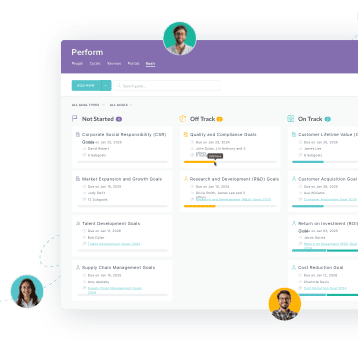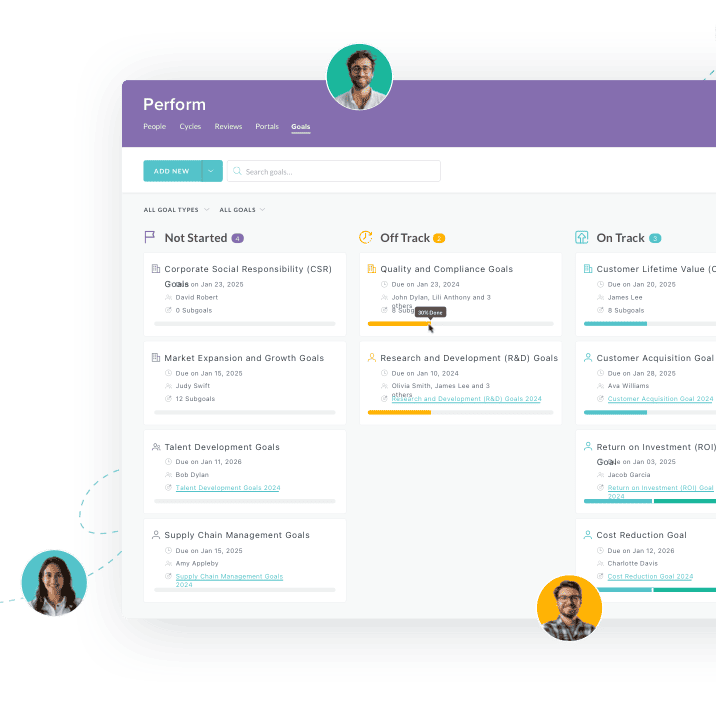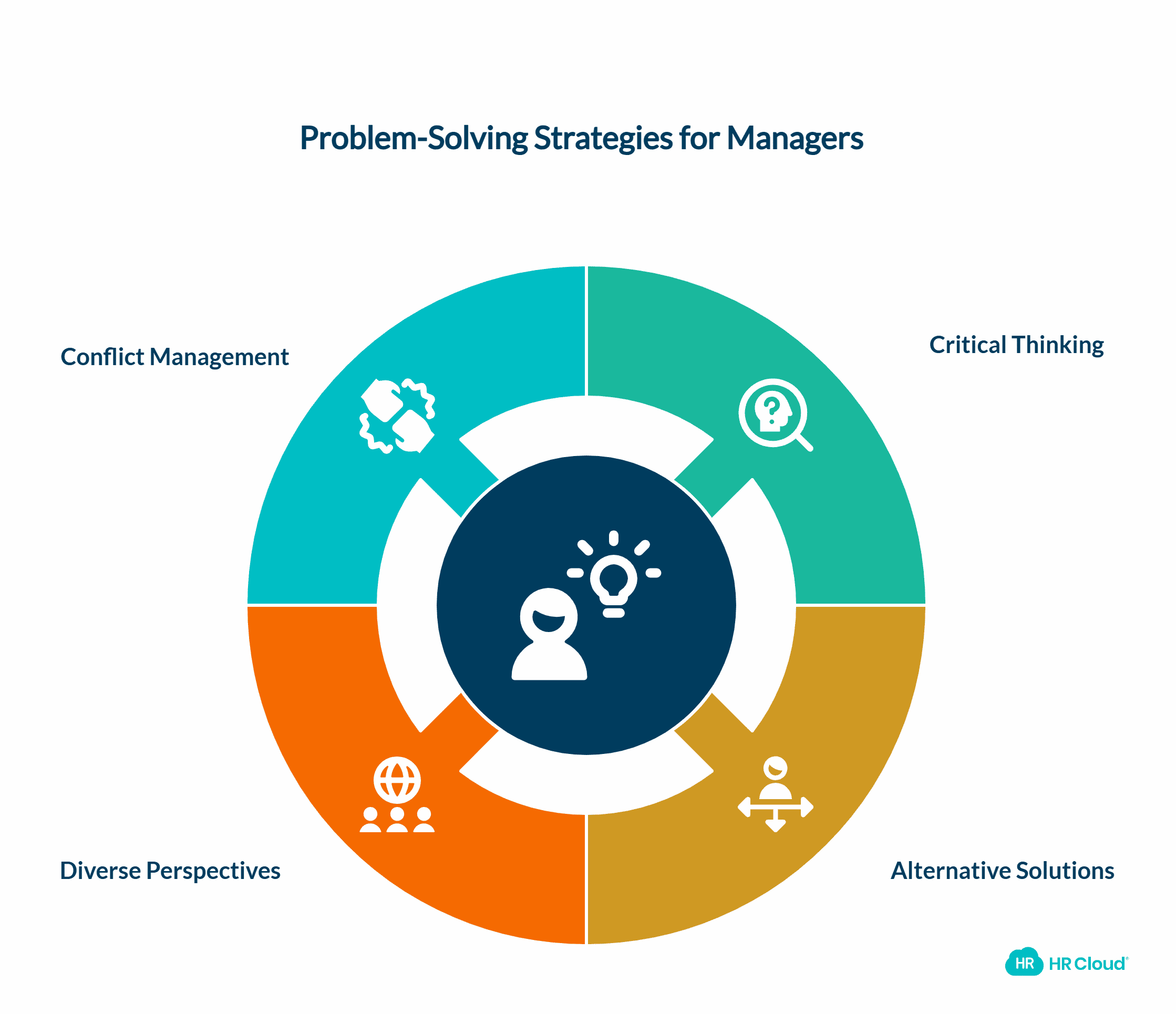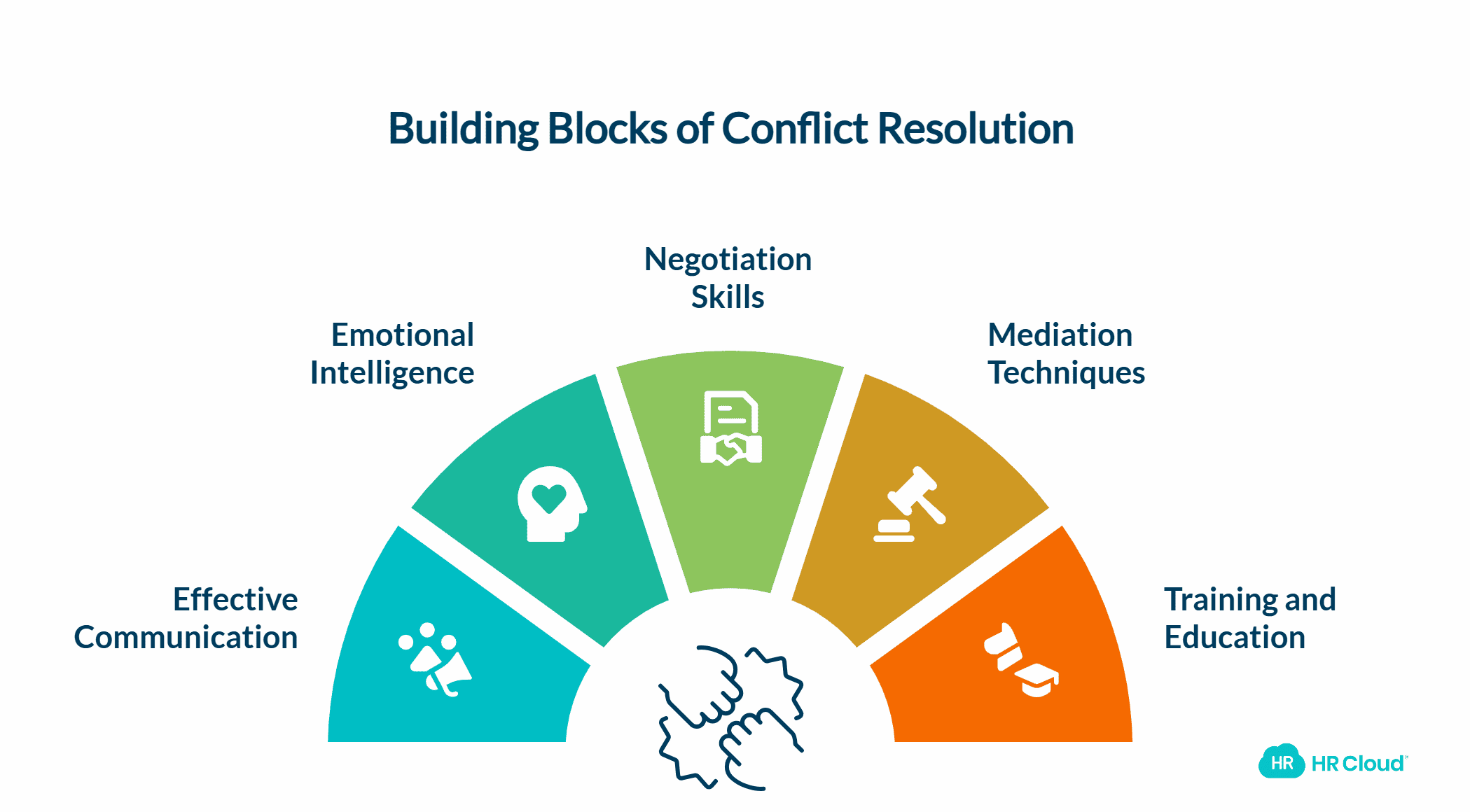12 Essential Skills Every Manager Must Have for Leadership Success

- 1. Communication
- 2. Strategic Thinking
- 3. Emotional Intelligence and Empathy
- 4. Problem-Solving Skills
- 5. Decision-Making Abilities
- 6. Time Management and Prioritization
- 7. Conflict Resolution
- 8. Coaching and Development
- 9. Ability to Inspire and Motivate
- 10. Adaptability and Resilience
- 11. Creativity and Innovation
- 12. Building Trust and Psychological Safety


 Cut onboarding time
by 60%—here's the
Ultimate Checklist
that helped do it.
Cut onboarding time
by 60%—here's the
Ultimate Checklist
that helped do it.

Management skills determine whether teams thrive or struggle. According to Gallup's 2025 State of the Global Workplace report, managers account for 70% of the variance in team engagement, while SHRM's 2026 research reveals that 46% of CHROs now prioritize leadership and manager development as their top organizational priority. Yet global employee engagement fell to its lowest levels since the pandemic, with manager engagement dropping from 30% to 27%—costing organizations an estimated $438 billion in lost productivity.
The gap between what managers need and what they possess has never been wider. This guide explores the 12 essential management skills every leader must develop, backed by current research and practical frameworks you can implement immediately. Whether you're a first-time manager or seasoned executive, mastering these competencies will transform your leadership effectiveness and team performance.
Why Management Skills Matter More Than Ever in 2025
The workplace has fundamentally changed. Remote and hybrid teams demand different leadership approaches. AI tools require managers who can coach humans and technology simultaneously. Employees expect transparency, purpose, and growth opportunities—not just paychecks.
SHRM's 2025 research shows that nearly half of organizations (49%) identify systems and resource management skills—including complex problem-solving and decision-making—as critical for future success, yet 78% report difficulty finding candidates who possess them. This means developing your current managers isn't optional; it's strategic necessity.
The financial impact is substantial. Companies with strong management practices show 23% higher profit margins than those with weak management structures. Organizations with highly engaged employees experience 21% higher productivity, 22% higher profitability, and 41% lower absenteeism.
Let's examine the specific skills that drive these outcomes.
1. Communication
Communication sits at the foundation of effective leadership. Managers can't execute strategy, resolve conflicts, or build trust without the ability to convey ideas clearly and listen actively.
According to The State of Business Communication, 72% of business leaders believe that effective communication increases team productivity, while 52% of knowledge workers report that improved communication positively impacts their performance.
Effective communication requires multiple dimensions:
Active listening means giving full attention, maintaining eye contact, asking clarifying questions, and summarizing what you've heard before responding. When team members feel heard, they contribute more openly and take greater ownership of their work.
Clear direction-setting ensures everyone understands goals, priorities, and expectations. Ambiguity creates anxiety and wasted effort. The best managers articulate the "what" and "why" clearly, then trust their teams to determine the "how."
Feedback delivery requires balancing honesty with empathy. Constructive feedback focuses on specific behaviors and their impact, not personality traits. Recognition should be equally specific—"Your analysis in yesterday's client presentation directly addressed their concerns" resonates far more than generic praise.
Transparent communication builds trust. Share the information your team needs to make good decisions, even when news isn't positive. Explain the reasoning behind decisions, especially difficult ones.
HR Cloud's Workmates platform facilitates transparent communication across distributed teams through customizable channels, company announcements, and real-time recognition feeds that keep everyone informed and connected.
2. Strategic Thinking
Strategic thinking elevates managers from task-coordinators to organizational leaders. It's the ability to see patterns, anticipate challenges, connect daily work to long-term goals, and make decisions that position your team for future success.
Strategic managers ask better questions: How does this initiative support our three-year objectives? What market shifts might impact our team's relevance? Which capabilities will we need that we don't currently possess?
Long-term vision means seeing beyond quarterly goals to multi-year horizons. Strategic managers can set goals that align with the company's future direction, keeping an eye on industry trends and competitive positioning.
Scenario planning prepares teams for multiple futures. The best managers don't just execute plans; they anticipate obstacles and prepare contingencies. This adaptability became critical during recent disruptions and remains essential as AI, automation, and market volatility reshape industries.
Resource alignment ensures your team's efforts create maximum impact. Strategic thinking means knowing when to say no—declining projects that don't align with priorities so you can fully resource initiatives that matter most.
SHRM's 2025 research notes that over half of CHROs (53%) expect increased investment in rapid skills development to help employees adapt alongside AI. Strategic managers recognize this shift and proactively build their teams' capabilities rather than reacting to skill gaps after they become critical.
HR Cloud's People HRIS provides the workforce analytics managers need for strategic planning—skills inventories, succession planning data, and performance trends that inform resource allocation decisions.


3. Emotional Intelligence and Empathy
Emotional intelligence drives leadership effectiveness more than IQ or technical skills. It's the ability to recognize and manage your own emotions while understanding and influencing the emotions of others.
Empathy is one of the strongest predictors of effective leadership. Leaders who actively listen, seek to understand team perspectives, and respond with compassion foster trust and loyalty.
Emotionally intelligent managers notice when team members seem stressed or disengaged before it escalates to performance issues. They create psychological safety where people feel comfortable admitting mistakes, asking for help, and challenging ideas constructively.
Self-awareness forms the foundation. You can't manage your emotional responses if you don't recognize your triggers, biases, and patterns. Regular reflection, seeking feedback, and potentially working with a coach helps develop this awareness.
Empathy means genuinely caring about your team members' experiences and challenges. Research from multiple sources indicates that unfair pay, lack of recognition, and insufficient collaboration are major drivers of employee dissatisfaction—issues that empathetic managers can identify and address proactively.
Relationship building creates the foundation for difficult conversations. When managers invest time understanding team members' aspirations, values, and personal circumstances, they earn the trust required to deliver honest feedback and make tough requests.
HR Cloud's employee engagement platform includes pulse surveys and feedback tools that help managers stay attuned to team sentiment and respond with empathy before small issues become major problems.
4. Problem-Solving Skills
Problems define management. Budget constraints, resource conflicts, technical challenges, market shifts—managers who excel turn obstacles into opportunities.
Effective problem-solving follows a disciplined process: define the problem accurately (many teams solve the wrong problem), gather relevant information, generate multiple potential solutions, evaluate options against clear criteria, implement the chosen approach, and learn from results.
Critical thinking means questioning assumptions and examining problems from multiple angles. The obvious solution isn't always the best solution. Sometimes the presenting problem is merely a symptom of a deeper issue.
Creative problem-solving generates novel approaches. The managers who drive innovation don't just optimize existing processes; they reimagine what's possible. Encourage your team to challenge conventional wisdom and experiment with new approaches.
Collaborative problem-solving leverages diverse perspectives. The best solutions often emerge from bringing together people with different expertise, experiences, and viewpoints. Create space for genuine dialogue, not just rallying support for predetermined answers.
Decision paralysis kills momentum. While thoughtful analysis matters, managers must balance thoroughness with speed, making decisions with incomplete information and adjusting course as new data emerges.
5. Decision-Making Abilities
Decision-making separates effective managers from overwhelmed ones. You face countless choices daily—which priorities to pursue, how to allocate limited resources, when to escalate issues, how to respond to conflicts.
Good decision-makers analyze facts carefully before making choices to prevent unconscious biases. The process includes gathering information, evaluating options, and determining the best path forward.
Data-driven decision-making grounds choices in evidence rather than gut feelings. Gather relevant metrics, benchmark against industry standards, and use analytics to spot patterns you might otherwise miss.
Timely decisions matter as much as correct decisions. Delayed decisions create ambiguity that paralyzes teams. When you lack complete information (which is always), identify your decision deadline, gather the best available data within that timeframe, make the call, and commit to adjusting if needed.
Transparent decision-making explains your reasoning, especially when decisions impact others significantly. People can disagree with a decision while respecting the process if they understand the factors you considered and the tradeoffs you weighed.
Learning from outcomes accelerates your decision-making quality. Reflect on past choices—both successful and unsuccessful—to refine your judgment. What signals did you miss? What assumptions proved incorrect? Which risks did you over- or underestimate?
HR Cloud's Perform platform provides the performance data managers need for objective decision-making about promotions, resource allocation, and development investments, removing bias from critical choices.
6. Time Management and Prioritization
Time management determines whether managers thrive or merely survive. You face competing demands: urgent issues from leadership, team members needing support, your own responsibilities, strategic projects, and unexpected crises.
Effective time management starts with ruthless prioritization. Not everything urgent is important, and not everything important is urgent. The best managers protect time for high-impact activities even when fires demand attention.
Strategic prioritization means understanding which activities create disproportionate value. Managers should prioritize tasks and activities, set realistic goals, and complete assignments efficiently while managing multiple responsibilities and projects.
Delegation multiplies your impact. Many managers struggle to delegate either because they enjoy the work, believe they can do it better, or fear burdening their team. Effective delegation develops your team's capabilities while freeing you for higher-leverage activities.
Meeting discipline protects everyone's time. Before scheduling a meeting, ask: Does this require synchronous discussion, or would async communication work better? Who genuinely needs to attend? What specific decisions or outcomes do we need? End meetings with clear action items and owners.
Personal energy management matters as much as calendar management. Schedule demanding cognitive work during your peak energy hours. Build buffers between meetings. Protect uninterrupted focus time for strategic thinking.
HR Cloud's Onboard platform automates new hire workflows, document collection, and compliance tracking—removing administrative burden from managers' calendars so they can focus on coaching and strategic priorities.
7. Conflict Resolution
Conflict resolution is an essential leadership skill. Often, there are disagreements over ideas, opinions, and plans between team members, leading to workplace conflict.
Effective managers don't avoid conflict; they address it constructively. Unresolved tensions fester, damage relationships, and drag down team performance. Addressed skillfully, conflicts surface important differences that lead to better solutions.
Early intervention prevents minor disagreements from escalating. When you notice tension, address it promptly through private conversations with involved parties. Understand each person's perspective before attempting resolution.
Neutral facilitation helps parties find common ground. The best conflict resolution rarely involves imposing solutions. Instead, help team members hear each other's concerns, identify shared interests, and collaboratively develop approaches that work for everyone.
Conflict resolution frameworks provide structure when emotions run high. Techniques like interest-based negotiation, active listening protocols, and structured problem-solving discussions keep conversations productive rather than defensive.
Cultural norms shape how conflict gets handled. Teams where disagreement is viewed as risky will suffer from artificial harmony—surface politeness masking underlying tensions. Model healthy conflict by disagreeing openly, focusing on ideas rather than people, and showing appreciation when others challenge your thinking.
Many organizations offer training in conflict resolution and mediation skills—investments that pay dividends in team cohesion and productivity. For additional strategies, explore proven conflict resolution approaches that maintain team cohesion during disagreements.
8. Coaching and Development
Great managers multiply their impact by developing others. Coaching transforms average performers into strong contributors and strong contributors into leaders.
Managers who received training focused on coaching and people development saw significant improvements in team engagement and performance. Yet many managers struggle with coaching because they've never received training in developmental conversations.
Regular one-on-ones create space for coaching. These aren't status updates; they're dedicated time for discussing challenges, career aspirations, skill development, and removing obstacles. Ask questions like "What are you learning?" and "What support do you need from me?"
Constructive feedback accelerates development when delivered skillfully. The best feedback is specific (describing particular behaviors), timely (delivered soon after observation), balanced (acknowledging strengths while addressing growth areas), and actionable (suggesting concrete next steps).
Growth mindset promotion encourages learning from failures. When team members make mistakes, coaching managers ask "What did you learn?" rather than "Why did this happen?" This subtle shift reduces defensiveness and promotes experimentation.
Development planning creates intentional growth paths. Work with each team member to identify their aspirations, assess current capabilities, and create actionable plans for building needed skills through stretch assignments, training, mentorship, and feedback.
Delegation as development assigns challenging work that builds new capabilities. Effective developmental delegation provides appropriate support and guardrails while allowing team members to struggle productively and learn from the experience.
Platforms like HR Cloud's Perform provide structured frameworks for development conversations, goal tracking, and feedback documentation that strengthen your coaching impact.
9. Ability to Inspire and Motivate
A leader's ability to inspire others is paramount. Teams can move forward only if individuals work together toward common goals. People follow leaders not because they fear punishment, but because they believe in the vision and mission of the company.
Inspiration comes from connecting work to purpose, recognizing contributions, and demonstrating genuine care for people's success and wellbeing.
Purpose connection answers "Why does this matter?" People tolerate tedious tasks when they understand how their work contributes to meaningful outcomes. Great managers constantly reinforce this connection—explaining how a data entry project improves customer experience, or how quality checks prevent safety incidents.
Recognition and appreciation fuel motivation. Research shows that recognition and feedback from managers significantly drive employee engagement. Effective recognition is specific, timely, and connects individual contributions to team success.
Authentic enthusiasm is contagious. Your energy (or lack thereof) sets the tone. Managers who genuinely care about their work and believe in their team's mission inspire others naturally. Authenticity matters more than charisma—people follow sincere leaders even when they're not particularly dynamic.
Challenge and support balance creates optimal motivation. Challenge people with ambitious goals while providing the resources, training, and support they need to succeed. This combination signals confidence in their abilities while acknowledging the difficulty of what you're asking.
HR Cloud's recognition and rewards platform makes it simple to acknowledge contributions consistently, creating a culture where appreciation flows freely and people feel valued for their work.


10. Adaptability and Resilience
Manager well-being declined significantly in 2024, with stress, exhaustion, and disconnection widespread—particularly among women managers and those under 35. Resilience determines whether managers sustain their effectiveness through inevitable challenges.
Emotional regulation helps you stay calm under pressure. Teams look to their manager's response when crises emerge. If you panic, they panic. If you maintain composure while acknowledging difficulty, they find confidence to navigate uncertainty.
Perspective-taking prevents catastrophizing. Most setbacks that feel monumental in the moment become minor footnotes. Ask yourself: "Will this matter in six months?" This doesn't minimize legitimate problems, but it helps maintain proportion.
Recovery practices prevent burnout. Sustainable high performance requires rest, boundaries, and activities that recharge you. The most resilient managers protect time for exercise, relationships, hobbies, and genuine disconnection from work.
Growth mindset frames challenges as development opportunities. Resilient people don't avoid failure; they reinterpret it as feedback and learning. When projects don't work out or mistakes happen, ask "What can we learn?" rather than dwelling on what went wrong.
Adaptability means adjusting your approach when circumstances change. The strategies that worked yesterday may not work tomorrow. Successful leaders get out of their comfort zones and quickly adapt to changing work conditions, wearing multiple hats and problem-solving on the fly.
11. Creativity and Innovation
Creativity isn't just for designers and marketers. Managers need creative thinking to solve novel problems, streamline processes, engage team members, and differentiate their organization from competitors.
Curiosity drives innovation. The most creative managers constantly question "Why do we do it this way?" and "What if we tried something different?" They view constraints as creative challenges rather than insurmountable barriers.
Experimentation culture encourages calculated risk-taking. Create space for team members to test new approaches, learn from failures quickly, and scale successful innovations. Make it safe to propose unconventional ideas without fear of ridicule.
Cross-pollination sparks fresh thinking. Expose yourself and your team to ideas from other industries, functions, and disciplines. Some of the best innovations come from applying concepts from unrelated fields to your specific challenges.
Process innovation improves operations continuously. Don't just optimize existing workflows; reimagine them. Could automation eliminate this task entirely? Could we reorganize responsibilities to better leverage individual strengths?
HR Cloud's automation capabilities free managers from repetitive administrative work, creating capacity for creative problem-solving and strategic innovation that drives competitive advantage.
12. Building Trust and Psychological Safety
Trust forms the foundation of high-performing teams. Without trust, people withhold concerns, avoid risk, and protect themselves rather than pursuing team goals.
Consistency builds trust over time. Say what you'll do, then do it. Small promises kept accumulate into reliable patterns that people count on. Conversely, broken commitments erode trust quickly—even when you have good reasons.
Vulnerability deepens connections. Leaders who admit mistakes, acknowledge uncertainty, and ask for help create permission for others to do the same. This authenticity builds psychological safety where people contribute fully without fear of judgment.
Transparency demonstrates respect. Share information your team needs to make good decisions. Explain the reasoning behind choices, even difficult ones. When you can't share something, explain why rather than pretending nothing is happening.
Reliability means people can count on you. Show up consistently—in one-on-ones, during crises, and for mundane work. Your presence signals that you're invested in your team's success, not just present when it's convenient.
Equity ensures everyone receives fair treatment. Monitor your decisions for bias—do certain people consistently receive choice assignments while others get routine work? Do you seek some people's input more than others? Fair treatment builds trust; favoritism destroys it.
Psychological safety lets people take interpersonal risks without fear of humiliation. Teams with high psychological safety innovate more, learn faster, and perform better because members contribute ideas, admit mistakes, and challenge assumptions freely.
How HR Cloud Helps Develop Essential Management Skills
Developing these 12 management skills requires both intentional practice and supportive infrastructure. HR Cloud's integrated platform provides tools that help managers strengthen their capabilities while simplifying day-to-day execution:
Workmates facilitates communication, recognition, and engagement—helping managers practice transparent communication, deliver timely recognition, and build trust through consistent appreciation.
Perform supports coaching conversations, goal-setting, and performance tracking—providing frameworks for managers to develop their coaching abilities and make objective, data-driven decisions.
Onboard automates workflows and documentation—freeing managers from administrative burden so they can focus on strategic thinking, relationship building, and team development.
People HRIS centralizes workforce data—enabling strategic resource planning, skills gap analysis, and the analytics managers need for effective decision-making.
Together, these tools create an environment where managers can develop their skills through daily practice rather than abstract training alone. Research shows that managers who receive both training and consistent tool support see their well-being increase from 28% to 50%—demonstrating that development works best when paired with practical enablement.
The Path Forward: Investing in Manager Development
In the words of D. Wayne Calloway, former chairman and CEO of PepsiCo: "I'll bet most of the companies that are in life-or-death battles got into that kind of trouble because they didn't pay enough attention to developing their leaders."
The 12 essential management skills outlined in this guide represent the competencies that separate thriving organizations from struggling ones. Communication, strategic thinking, emotional intelligence, problem-solving, decision-making, time management, conflict resolution, coaching, inspiration, adaptability, creativity, and trust-building aren't innate talents—they're learnable skills that improve with deliberate practice and proper support.
The managers who master these capabilities build high-performing teams, drive retention, accelerate innovation, and create workplace cultures where people thrive. Those who don't see team engagement suffer, turnover increase, and organizational momentum stall.
The financial case is clear: Organizations with highly engaged employees experience 21% higher productivity and 22% higher profitability. But beyond the numbers lies something more fundamental—managers shape daily experience for millions of people. Every conversation, decision, and action either builds or erodes trust, engagement, and wellbeing.
Development doesn't happen through training alone. It requires infrastructure that makes good management practices easier than poor ones—platforms that facilitate recognition, streamline performance conversations, and free managers from administrative burden so they can focus on people.
Ready to develop these essential management skills in your organization? Discover how HR Cloud's Workmates platform provides the tools managers need to communicate effectively, recognize contributions, and build engaged, high-performing teams. Book a demo today to see how integrated HR technology accelerates leadership development and drives measurable business impact.
Frequently Asked Questions About Management Skills
What are the most important skills for new managers?
The most important skills for new managers include communication, emotional intelligence, decision-making, delegation, and coaching abilities. According to SHRM's 2026 research, 46% of CHROs prioritize leadership and manager development, with communication and people skills being the foundation of effective management. New managers should focus first on building trust, listening actively, and learning to balance supporting their team with delivering results.
How can managers improve their leadership skills?
Managers can improve leadership skills through targeted training programs, seeking mentorship, practicing active listening, soliciting 360-degree feedback, and using performance management tools. Gallup research shows that managers who receive role-specific training combined with consistent organizational support see their well-being jump from 28% to 50%. Focus on one skill at a time, seek feedback on progress, and practice new behaviors consistently until they become natural.
What's the difference between management and leadership skills?
Management skills focus on organizing, planning, and executing tasks efficiently—capabilities like time management, delegation, and problem-solving. Leadership skills center on inspiring, motivating, and developing people—qualities like emotional intelligence, vision, and coaching. The most effective managers possess both skill sets, using management capabilities to drive operational excellence while leveraging leadership qualities to build high-performing, engaged teams.
How long does it take to develop strong management skills?
Developing strong management skills typically takes 1-2 years of deliberate practice combined with formal training. However, foundational competencies can be built in 3-6 months with focused development programs. According to implementation research, most organizations fully launch recognition and development programs within 8-12 weeks and see measurable improvements in manager effectiveness during that timeframe. The key is combining learning with immediate practice and receiving regular feedback.
Why do so many managers struggle with their roles?
Research from the Chartered Management Institute shows that 82% of managers in the UK were "accidental managers"—promoted without any leadership training or preparation. Gallup also reports that most managers were selected for their roles based on being successful at non-managerial positions or tenure with the company rather than actual leadership capability. Only 1 in 10 people naturally possess management talent, while another 2 in 10 have basic characteristics that can be developed with proper coaching and support.

Keep Reading
Best Onboarding Practices for Manufacturing Companies: 15 Proven Tactics That Boost Retention
"Three simple changes to our onboarding process cut our 30-day turnover from 28% to 12%.
Equity in the Workplace: A Practical Guide to Building Fairness and Opportunity
Workplace equity shouldn't be an aspiration—it should be the foundation of how
7 Employee Relations Responsibilities That Transform Workplace Culture
Employee relations shapes how people experience work every single day. It's not just
Like What You Hear?
We'd love to chat with you more about how HR Cloud® can support your business's HR needs. Book Your Free Demo

Build a Culture of Recognition. Boost Engagement. Guaranteed.
Workmates empowers employees to stay informed, connected, and appreciated—whether they’re on the front line, in the office, or remote. Recognition drives 12x higher engagement.Trusted by industry leaders in every sector




Cut Onboarding Costs by 60%.
Take the confusion and follow-ups out of onboarding with automated workflows, digital forms, and structured portals—so new hires ramp faster 3X quicker.Trusted by industry leaders in every sector




